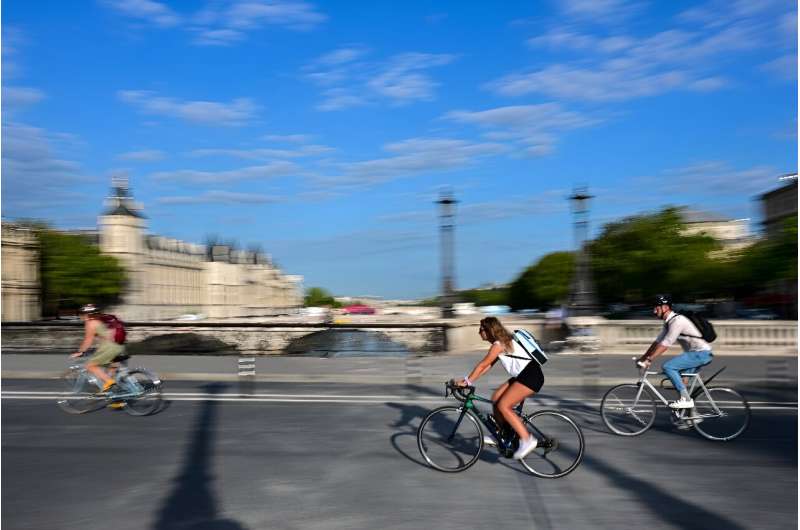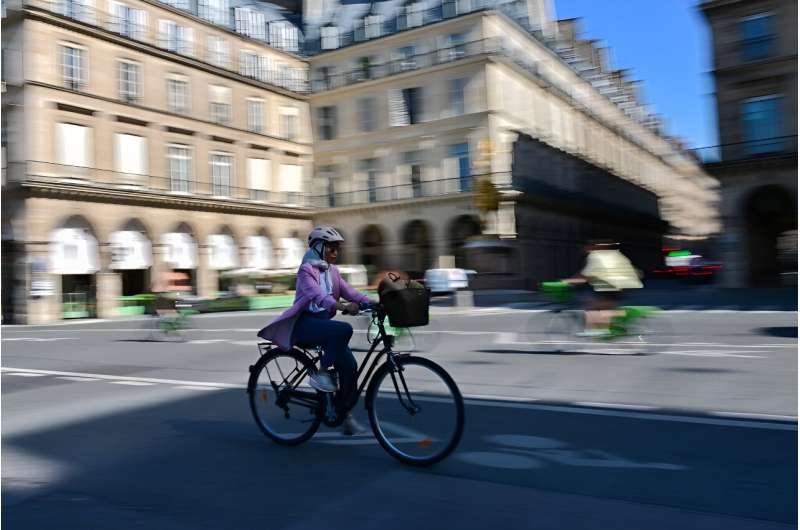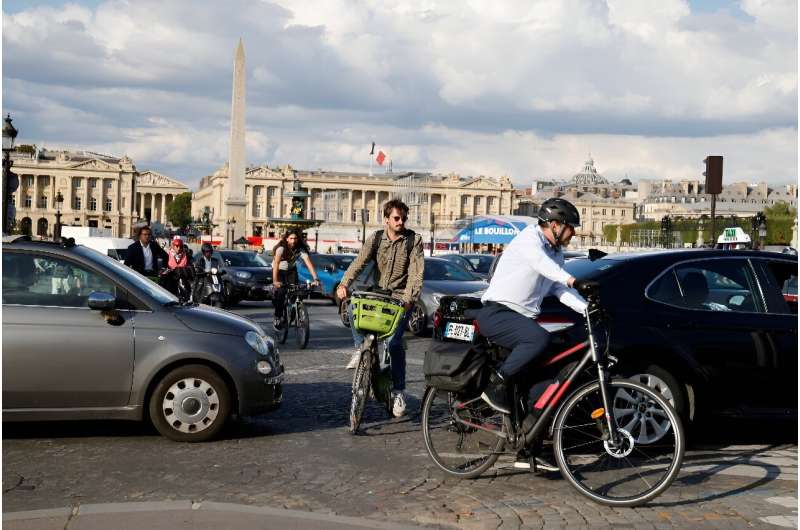This article has been reviewed according to Science X's editorial process and policies. Editors have highlighted the following attributes while ensuring the content's credibility:
fact-checked
reputable news agency
proofread
Forget company car, France embraces the company bike

As the popularity of cycling soars in France, a growing number of companies are giving employees the chance to ditch driving in favor of a greener, healthier alternative: the company bike.
The number of cycling commutes rose by 15 percent in 2022, thanks in part to electric bikes, the COVID pandemic and schemes designed to make cycling more accessible to employees.
For Remi Tricaud, 44, who works for an IT company near the southeastern city of Lyon, the prospect was so enticing that he decided to give up his car altogether.
He said his old commute would often take him 40 minutes, "whereas now, even when it's raining, I'm 20 minutes away all the time."
"When you know the way, you can go via nice places," he added.
The company he works for, Coexya, currently has a fleet of 120 bikes available to its employees across France, an increase from 75 in 2021.
Tricaud pays 35 euros ($37) a month to hire a bike, which includes insurance and anti-theft protection.
He also receives a 120 euros allowance spread over three years for related equipment such as panniers.
The bikes are all electric models which are leased long-term from the distributor Cyclable and serviced every three months at the Coexya site.
Tricaud said the fact that he didn't have to carry out his own maintenance was a big incentive to get behind the handlebars.

Coexya's administrative and financial director, Leila Julien, said the company was using the cycle-to-work scheme to try to attract new recruits.
"Our employees are young and either don't have a driving license or don't have a car. Our area is poorly served by public transport. And as we're in a very tight job market, we've sought to be more attractive," she said.
"We want our employees to work on fulfilling projects, and if we can make life easier for them on the side, we have to do it," she added.
Niche market
The example of organizations such as Coexya, however, should not obscure the fact that company bikes are still a relatively niche market in France, said Louis Duthoit from the Federation of Bicycle Users (FUB).
While Germany has one million bikes in circulation, France only has "10 to 20,000, according to estimates by service providers," he said, referring to 'velos de fonction'—bikes employees rent from their companies to travel to work.
But a number of start-ups have seized the moment, such as Tandem, which manages 1,000 bikes for 80 companies and has seen sales more than double every year since 2020.
The Paris-based provider acts as an intermediary—buying the bikes from manufacturers or distributors and renting them to client companies, while negotiating local delivery and maintenance.
"The employee gains access to a bike worth an average of 2,000 to 2,500 euros, which he or she would not necessarily be able to afford," said Tandem CEO Arthur de Jerphanion.

Billion-euro industry
As well as renting company bikes, many in France have been inspired to buy their own, attracted by the physical and environmental benefits.
"For more than 10 years now, cycling has been enjoying double-digit growth," said Sophie Rapinel, from the Velo et Territoires network.
The market is worth several billion euros and more than half of French households now own at least one bike, according to the Society and Consumption Observatory (ObSoCo).
"I really enjoy cycling. I'm sure it's much better for my health. Physical health, but mental too," said Cecilia Rousselot-Denis, who cycles 13 kilometers (eight miles) every day to work in the central city of Tours.
"I'm in my closed office, but I can see the seasons. Every morning I discover little things that you don't take the time to see in the car. Psychologically, it does me a lot of good," the doctor added.
But the growing number of bike enthusiasts also raises the question of infrastructure, with ObSoCo noting that just under half of French cyclists have access to cycle paths on most of their journeys.
A plan presented by French Prime Minister Elisabeth Borne in May set a target of creating "100,000 kilometers of cycle paths by 2030," which is double the current amount.
The initiative could also be a boost to France's goal to overtake Germany as the world's leading destination for cycle tourism.
Sales generated by cycle tourism in 2020 were estimated at 4.6 billion euros, according to France's Directorate General for Enterprise (DGE).
© 2023 AFP


















